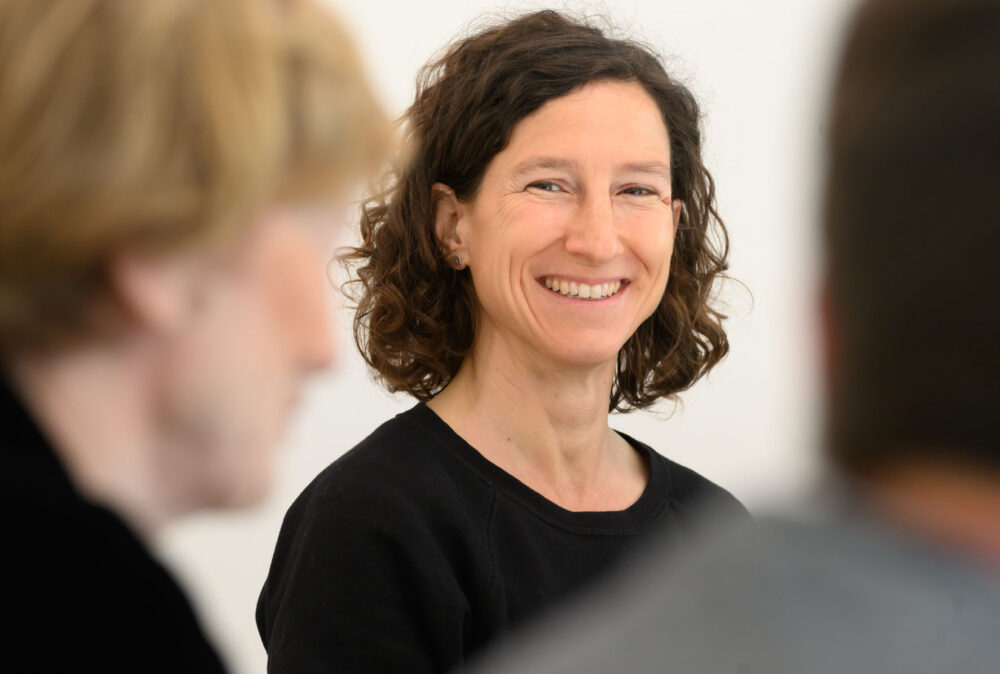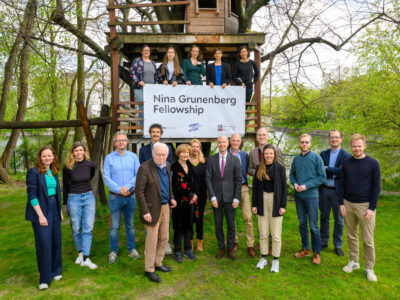2023 Nina Grunenberg Fellow: “There Are Often No Experts, Just Deadlines”
Are you looking for a crash course in education journalism? Want to finally get a better understanding of the practical realities of the federal school system so you can discuss it with decisions-makers? The first Nina Grunenberg Fellows focused intently on education issues in 2023. Freelance journalist Birte Gernhardt of Cologne was one of those fellowship recipients. In an interview, she discusses her experiences, from the shocking and interesting to the profoundly gratifying.

Publix: You were one of the nine fellows during the first year of the Nina Grunenberg Fellowship for Education Journalism. Why did the program appeal to you?
Birte Gernhardt: The topic of education affects me personally. My 10-year-old son has just moved from elementary school to high school, and during that switch, I got a better idea of the problems that schools are facing. I wanted to understand how education policy works in Germany.
Publix: How is education journalism faring in Germany?
Birte Gernhardt: I was shocked to hear how few education journalists there are in Germany and how many newsroom resources and jobs are being cut. Education is one of the most important subjects of our time, and there needs to be a lot more reporting on it. I also feel a social responsibility as a journalist to keep the conversation about education going.
Publix: What special access or types of information did the fellowship give you?
Birte Gernhardt: Over the course of four weeks, we engaged in long discussions with many education experts. They included federal and state politicians, academics, education journalists and activists. But we also gained practical insights, spending several days at schools and familiarizing ourselves with different innovative concepts.
Publix: What are the biggest issues?
Birte Gernhardt: The entanglement of responsibilities between the federal and the municipal level. The federal system certainly has its advantages, but it is also the source of many difficulties. Then there is the major factor of teacher shortages, which many sides are trying to combat, but still with far too little enthusiasm or new ideas. And the educational injustice caused by social injustice. The current immigration debates aren't exactly helping either.
Publix: Do you gain any key insights?
Birte Gernhardt: On the one hand, it's great that individuals at all levels can make a difference and initiate innovations. But it is also a bit frightening that both politically and in schools, the programs are often dependent on a very individual, personal commitment.
Publix: What was the structure of the program?
Birte Gernhardt: We met twice for two weeks at a time in Berlin, Leipzig, Hamburg and North Rhine-Westphalia. You receive financial support at the beginning of the fellowship so that you can concentrate fully on the program. In everyday life, there often isn’t enough time to familiarize yourself thoroughly with a subject. In many newsrooms, there are often no experts, just deadlines. The reason this fellowship is so good is that you have the chance to train to become expert and then stay on top of the subject with the help of new networks.
Publix: What impact does the fellowship have?
Birte Gernhardt: We had a really great feeling of community among the fellows. This led to a lively journalistic exchange that will certainly help us in the future. The fellowship really encouraged me to pursue my commitment to education journalism. This professional recognition was extremely gratifying.
Gernhardt works as a freelance journalist in the fields of science, politics, sustainability and social issues. She produces video reports for AFP and SID as well as two podcasts. Learn more at http://www.gernhardtmedia.de/
Publix is the sponsor of the Nina Grunenberg Fellowship. Support for the program is provided by the Schöpflin Foundation, the Wübben Stiftung Bildung and the ZEIT STIFTUNG BUCERIUS. Applications for the second year of the program are due by February 9, 2024. More detailed information can be found here (only available in German).
